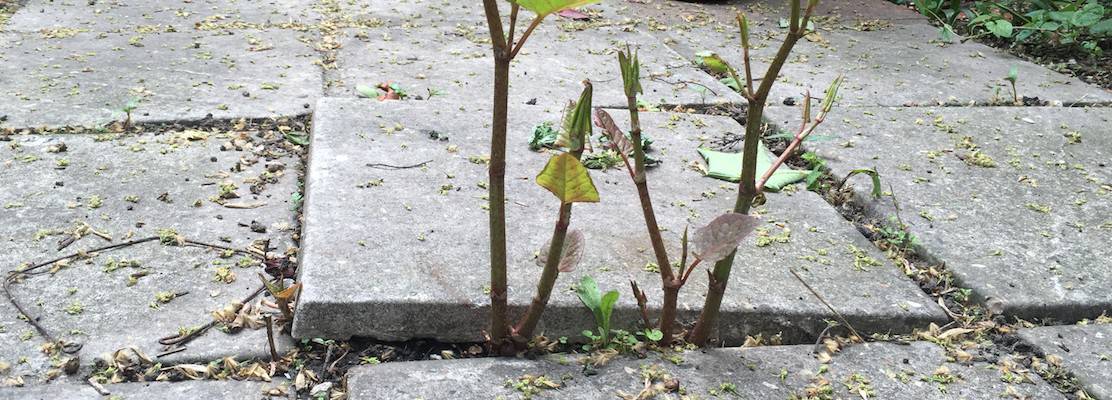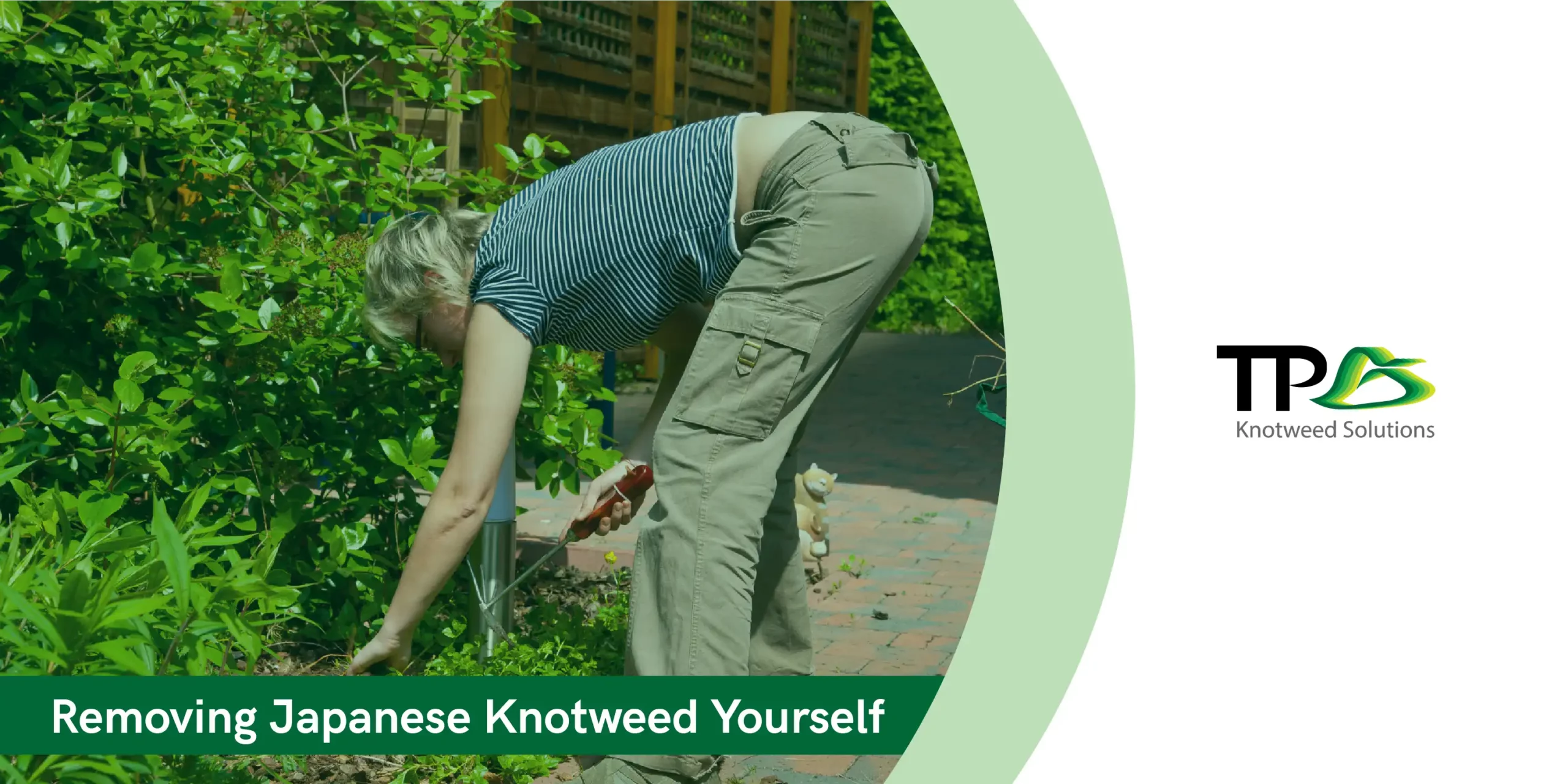If you find knotweed in your garden, you might be wondering what to do next.
Thoughts of damages, cost, and the impacts of knotweed on your mortgage may be causing you worry. Several news stories in recent years have fuelled the fear for Britain’s most invasive weed. As a result, we often visit properties where members of the public have tried to do a DIY job removing their Japanese knotweed. This is a mistake.
On no account should you attempt to remove the knotweed yourself. It is not illegal to have knotweed on your site, but irresponsible behaviour leading to the spread of knotweed to neighbouring land can earn you an ASBO, incurring fines of up to £2,500. If you do discover knotweed in your garden, there are several key things to bear in mind:
Is it necessary to report Japanese knotweed?
If you detect a Japanese knotweed infestation on your property, you are not legally compelled to notify the authorities or local Council of the presence of the plant. Even though it is prohibited to allow the plant to grow outside of your property, you are not compelled to notify your neighbours or the local authorities about the existence of Japanese knotweed on your property.
Is it against the law to grow Japanese knotweed in your yard or garden?
In the United Kingdom, it is not prohibited to grow Japanese knotweed in your backyard or on your property. If you have found the plant on your property, you are under no legal responsibility to tell anybody about it or to treat the plant in any way at this time. The responsibility for assuring that the plant doesn’t spread onto the surrounding property, whether privately or publicly held, is on your shoulders instead.
In contrast to certain other invasive species that need prompt behavior on behalf of the proprietor, the government, as well as your neighbours, are not required to be notified of the infestation. Similarly, you are not required to report Japanese knotweed found on someone else’s property; however, you may opt to do so if you believe that the plant has the potential to spread to your property or if you think that it is causing additional environmental damage.
The first thing to do if you find Japanese knotweed in your garden is to call in the professionals.
If Japanese knotweed is managed professionally and responsibly, it can be permanently removed from your garden. TP knotweed are a CHAS accredited contractor, offering comprehensive Japanese knotweed treatment plans to both the public and private sector at the UK’s most competitive rates. Get in touch with us as soon as you identify the plant, and we’d be happy to visit your property and perform a survey.
- Benefit from the services of the fastest acting Japanese knotweed removal company in the UK.
- Our competitive pricing means you’ll always get a great quote.
- Choose from herbicide treatments, on-site burial, or complete excavation and disposal at a licensed landfill.
- We can also provide a 10-Year Insurance Backed Guarantee, ensuring you peace of mind and a professional solution to your Japanese knotweed concerns.
Once you have informed us, we will handle the entire process for you, carrying out a survey and putting a Japanese knotweed removal plan in place. At TP knotweed, we can make the stressful process of removing knotweed simple and trouble-free for you.
If you find knotweed in your garden, get in touch with TP knotweed today on 0800 389 1911 or contact us online.
When should you file a complaint?
If you believe that Japanese knotweed is causing harm to your local environment, if you think that it may soon reach your premises, or even if you think that local authorities have not recognised it, you should file a complaint with the appropriate authorities. Even though you are not lawfully compelled to do so, notifying the proper authorities about Japanese knotweed may assist the government in keeping track of the constant danger posed by this invasive species.
Do estate agents have to disclose Japanese knotweed?
If you discover Japanese knotweed on your property, you should tell your real estate agent as soon as possible. If you want to sell a home that has Japanese knotweed growing on it, you should be as candid as possible with your real estate agent about the situation. If your real estate agent gets access to all of the information regarding your property, you will have a higher chance of selling it more quickly. They are legally compelled to display your house accurately, so if you fail to disclose the infestations to them, you run the risk of jeopardizing any future sales as well as your commercial connection with them.
Is it mandatory to inform prospective purchasers about Japanese knotweed?
You must immediately inform potential buyers about it. This is done through the use of the TA6 Real estate Information Form, which is completed by landowners and given to interested buyers so that they’ll have access to all of the information about the property. Failure to provide accurate information on this form may result in a complaint of deception or misrepresentation being brought against you and the cancellation of a transaction, which may impact any future purchases that you may make.
Is it necessary for a surveyor to record Japanese knotweed?
In their duties, a surveyor may come across Japanese knotweed and must report it within their professional survey report and to the mortgage company if they are conducting a mortgage valuation survey. Surveyors have an ethical obligation to report any invasive weeds they come across, regardless of compensating them for their services.
Surveyors qualified by the Royal Institution of Chartered Surveyors (RICS) are instructed to search for Japanese knotweed, mainly if they believe that the region in which the property is situated is particularly at risk of possessing the plant. Regrettably, there are still situations when surveyors fail to detect Japanese knotweed in its natural habitat. If surveyors come across a suspect plant, they may recommend that you have a specialist Japanese knotweed survey report carried out as a precaution.
How do you go about reporting Japanese knotweed?
If you decide to file a report, you may want to take a few observations on the invasion before you go in. By giving as much information as possible about the issue, you’ll obtain a better reaction from the local authorities or a neighbor or organisation.
You may, for instance, offer a reasonable approximation of how much area the plant has impacted.
The precise position may be documented by taking an image and attaching it to its coordinates. This may be very helpful when addressing a Japanese knotweed invasion in a remote place or along a trail without apparent markers. You might also note whether or not the knotweed has been treated or if it seems that an effort has been made to eliminate it.
How can you notify your neighbors about Japanese knotweed on their property?
Japanese knotweed may be prevented from spreading to your property by reporting it to local authorities, but only if you have officially informed your neighborhoods of the infestation.
Once you have proof that they have ignored your official letter, you may ask the local government for a Community Protection Notice (CPN) so that they are forced to deal with the infestation on their premises.
A CPN versus your neighbor must be established if it can be shown that they have not taken any reasonable measures to deal with the invasion. When dealing with Japanese knotweed, it’s a good idea to chat to your neighbour first to see if you can work out a solution without having to call the police.
How do you notify your landlord about Japanese knotweed?
You may notify your landlord about Japanese knotweed by contacting them with just as much information as possible about the infestation. As with other Japanese knotweed findings, it’s essential to deal with any infestation as soon as possible to prevent treatment expenses from spiraling out of hand.
Depending on the terms of your lease agreement with your landlords, you may be responsible for treatment fees. In the case that this occurs, you should look into the origin of the infestation since the knotweed might have entered from some other land, rendering the owners of that property accountable instead.




